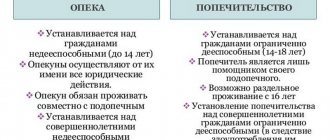Home / Guardianship / How to take custody of a child from an orphanage
The problem of family placement for children who are left without parental care is still a priority for our country.
Orphans (children whose parents have died) and children from dysfunctional families (whose parents are deprived of parental rights, are unknown, and do not fulfill the responsibilities of raising and supporting children) need guardianship.
Until people are found who can and want to replace the parents of one of these children, they are placed in specialized institutions (orphanages, boarding schools, orphanages).
This article is devoted to the procedure for appointing guardianship or trusteeship and accepting an orphan from an orphanage into a family.
What is guardianship
Guardianship is one of the forms of placing a child in a family. It can be free or paid when an agreement on foster care or foster family is concluded between the guardian and the guardianship and trusteeship authority (hereinafter referred to as the AOiP) .
Guardianship is possible for children under 14 years of age. If the child is over 14 years old, a guardian is appointed. If guardianship was formalized earlier and the ward has reached the specified age, guardianship is not cancelled, the guardian simply automatically receives the status of a trustee.
Guardianship or guardianship is established over children left without parental care. For example, if they are deprived of their rights, died, or are declared missing.
The duties and rights of guardians are regulated by Art. 36 Civil Code of the Russian Federation:
- Cohabitation with the ward is required. In some cases, separation from a child over 16 years of age is allowed with the permission of the Educational Institution, if this does not contradict his interests and does not harm his upbringing;
- Guardians are the legal representatives of their wards and can and should represent their interests without special powers. An exception is the alienation of their property: this will require the consent of the POiP;
- Guardians are required to promptly notify the POiP about a change of residence; take care of the health, development, education of wards;
- Guardians have the right to make transactions with the property of their wards, but only with the permission of the POiP;
- Guardians are required to promptly report on the costs of the children under their care and the state of their property.
Note: in addition to rights and obligations, guardians are subject to liability in accordance with Art. 26 Federal Law dated April 24, 2008 No. 48-FZ. For example, they undertake to compensate for property damage to their wards caused as a result of their own illegal actions. In some cases, they may be removed from guardianship by the act of the OiP.
Up to what age can you get custody of a child?
My grandmother is 65 years old, she would like to take custody of my sister (12 years old), since her parents suffer from alcoholism and do not provide for her. My grandmother has been doing this since childhood; my sister and I live with her. There was already a trial in the summer, my grandmother was collecting documents, but the court decided that she would stay with her parents. A little time passed and she moved back to her grandmother. It turned out that the prosecutor said that the grandmother would not be given guardianship because the age was no longer appropriate, but the question arises: why was there a trial then? And where is there a law that specifies up to what age can guardianship of a child be granted?
Elderly people over 60 years of age do not have the right to take a child into their family. It will not be possible to take custody of a child for those who have previously been removed from it or deprived of parental rights in relation to their biological children. There are health restrictions: the guardian must be legally competent and not have chronic diseases that are potentially dangerous to the health of others. A candidate who has a decent financial situation can obtain guardianship of a child. During the inspections, the condition of the existing housing, the availability of acceptable living conditions for the child, and material wealth are taken into account.
Who can be a guardian
According to Art. 146 of the RF IC, an adult capable citizen can become a guardian. Property or financial status also plays a role, but not a primary one. It is not necessary to have your own housing, but you will have to submit at least a rental agreement for residential premises to the POiP.
In each case, candidates are considered individually. The relationship with the future ward and the personal qualities of the guardian play a decisive role. The child’s opinion will be asked even if he is under 10 years old. But guardianship by a specific person over children over 10 years of age is established only with their consent.
Who definitely cannot become a guardian:
- A person who was previously a guardian or adoptive parent, but the adoption or guardianship was canceled due to his fault;
- Incapacitated or partially capable;
- Deprived of parental rights;
- Having a criminal record or being a former suspect in a criminal case for a crime against health and life, sexual integrity and freedom;
- Citizens who have an outstanding or unexpunged conviction for particularly serious or serious crimes;
- Persons in an official same-sex marriage registered on the territory of a foreign state in which such marriages are legalized;
- Suffering from alcoholism or drug addiction in a chronic form;
- People with diseases that make it impossible to accept a child into the family: severe oncology, tuberculosis, viral diseases.
Important! In addition to all other factors, the OIP determines the personal qualities of the future guardian and his ability to fulfill guardianship obligations.
Guardian's age over 60 years
The general rules are described in various sources and sites, however, in practice, many are faced with a bunch of questions to which they cannot find answers.
What is the age limit for a guardian of minors, up to what age can one become a guardian and up to what age can guardianship be issued? We will try to answer these questions for you.
In the Civil Code of the Russian Federation, Article 35 provides a closed list of official requirements for guardians. Regarding age, it states that guardians are legally capable persons over 18 years of age. The legislator has not determined the age limit.
However, in practice you can often hear that a person no older than 60 years old can become a guardian. This unspoken rule was applied by the guardianship authorities in order to protect the interests of children.
Citizens over 60 years of age may not be able to fully meet all the requirements for children. With age, memory, mental and physical indicators deteriorate. Guardianship requires a lot of activity, especially over children, and a lot of physical effort.
Another concern is that an adult may himself become infirm, either due to age and illness, or even die. This will be a strong psychological trauma for the child. Then he will have to get used to new people again, a new way of life, move, not to mention the loss of a loved one. Guardianship authorities try to ensure that guardianship ends on the basis of reaching 18 years of age, and not because of sad facts. Children should grow up in normal conditions under the guardianship of a responsible, active, positive person.
If there is a desire to appoint a person over 60 years of age as a guardian, the guardianship authorities cannot give a categorical answer if the citizen looks good and feels good. In any case, it is necessary to submit an application for consideration to the guardianship authorities, providing all possible data for a positive decision: medical certificates, references from neighbors, or even from work. If a citizen works, then the 2-NDFL certificate will also have a positive impact.
As mentioned above, close relatives have a priority right to guardianship, therefore guardianship authorities often appoint grandparents of children as guardians over 60 years of age.
How many children can give
The exact number of children is not regulated by any law. There are known cases where there were 14 minors in families. Everything depends on the capabilities of the guardians themselves, and they need to be calculated in advance. If the OAiP considers that a person will not be able to cope with his obligations, while he already has wards, he may be refused to transfer another child.
There is only one document on this issue - Decree of the Government of the Russian Federation dated May 18, 2009 No. 423. It literally says that the number of children in a foster family, as a rule, does not exceed 8 people. But there is no exact figure anywhere.
General provisions
An adult and fully capable person has the right to become a child’s guardian to raise the child, care for him and obtain the right to represent the interests of the child at the official level.
Guardians have virtually the same rights as parents.
However, there are still differences between the concepts of adoption and guardianship:
- guardians, as a rule, are given less rights in relation to children under guardianship than official parents;
- the performance of their duties is under stricter control by government agencies.
It is also possible to obtain guardianship of a child with living parents in situations where they are temporarily unable to fulfill their parental responsibilities due to absence or illness. In such a situation, it is possible for parents to transfer custody rights to trusted persons, usually family members.
In most cases, the guardians become the child's relatives, but it is also possible to obtain guardianship over a child from an orphanage with the possibility of further adoption.
How is guardianship different from adoption?
Guardianship and adoption have several differences:
| Guardianship | Adoption |
| Issued for children under 14 years of age | Children under 18 years of age can be adopted |
| Produced on the basis of the OO&P act | Performed on the basis of a court decision |
| The ward cannot take the guardian's surname | Adoptive parents have the right to change their full name. baby |
| Guardianship is valid until the age of 14, then the representative receives the status of a trustee, which is canceled when the ward reaches the age of majority | Valid indefinitely |
| Guardians are entitled to payments for the child and for fulfilling their obligations. | Adoptive parents support children on their own |
| Information about guardianship is transmitted to state and municipal institutions | The secrecy of adoption is maintained |
| The ward does not inherit the property of the guardian in the event of his death | The property of the adoptive parent is inherited by the adopted child |
Note! Guardians and trustees actually perform the duties of parents. But from a legal point of view, there is still a difference between adoptive parents, biological parents and guardians.
Guardianship of an elderly person - paperwork
If we still talk about how to take guardianship of an elderly person, then first of all you need to collect the necessary list of papers. All documents must be transferred to the guardianship authority, as well as to the court, which will recognize the person as incompetent. Each case requires separate documents, but the main thing is that there must be a medical report. In addition, a statement from the person who will provide guardianship is required.
To apply, you must also obtain permission to do so, confirming your right, namely by providing the necessary documents:
- characteristics from work;
- passport and TIN;
- a certificate confirming sanity and absence of mental disorders;
- certificate of good conduct.
How to obtain guardianship over an incapacitated elderly person?
If a person nevertheless decides to do this, then it is worth understanding that this procedure involves a number of nuances, namely:
- Guardianship can be filed either by a relative or by anyone over 18 years of age who has submitted an application to the guardianship authority (they will provide a sample form);
- this issue can only be resolved through the court, and it is necessary to provide a medical report and permission from the guardianship authority;
- The right to guardianship over an elderly incapacitated old person can be lost if all the conditions that are necessary for the quality of life of the ward or in the event of his death are not met.
How much do they pay for guardianship of an elderly person in 2018?
If we talk about how much a guardian is paid, then the Law of the Russian Federation can set him a pension in the amount of 16,350 rubles if he does not work. If you take out guardianship over an elderly incapacitated old man who received a disability as a child, then in this case you can receive an allowance in the amount of 5,500 rubles. Guardianship also provides certain social benefits upon retirement.
At what age can you become a guardian of an elderly person?
The answer to the question at what age you can become a guardian is quite simple - from the moment you gain full legal capacity (from 18 years of age). However, the guardian cannot be older than 80 years. The procedure does not clearly define at what age one can become a ward, since this type of guardianship or trusteeship can be issued over anyone by providing the relevant documents that confirm that he is incompetent. An elderly person is considered to be over 60 years of age.
How to take custody of a child from an orphanage
The future guardian will have to frequently interact with representatives of the PA. Almost every step is taken with their participation. But first, you need to contact the guardianship for a referral to a medical examination and foster parenting courses, having first collected all the documents. At the end, a conclusion will be issued.
Let us consider in detail how to take custody of a child and what is needed for this.
Step 1: submitting an application to the OOiP
The application is submitted to the AOiP at the location of the minor, if it is already known who exactly to take into the family. If not, the future guardian has the right to contact the POiP at his place of residence.
How to make an application
The application is filled out in the form approved by Order of the Ministry of Education dated January 10, 2019 No. 4. It contains information about the applicant, including personal data. At the end of the document, you need to check the box next to “Please give me a conclusion.”
Documentation
When applying to the OOiP, in addition to the application, you will need:
- Passport;
- Brief autobiography;
- Written consent of all family members;
- Marriage certificate (if available);
- Birth certificates of your children (if any);
- TIN;
- Extract from the Unified State Register or apartment rental agreement;
- Characteristics from the place of work.
Information about no criminal record in most cases is requested by the POiP independently, but a certificate from the police department will not be superfluous.
Step 2: passing the medical examination
Future guardians can undergo a medical examination at the clinic. The medical report is subsequently submitted to the Department of Internal Affairs to confirm the absence of diseases that could lead to a refusal to receive the child.
Step 3: completing training
Training is usually carried out at the PA or an authorized organization. They talk about the peculiarities of raising and interacting with children left without parents. They also find out whether the person is ready to take the child. Based on the results, an exam is passed and a certificate is provided.
Step 4: Home Check
Having received a certificate of passing the exams and a medical report, you need to submit them to the OiP. Within three days, employees will organize an inspection of the applicant’s living conditions.
During the inspection, they pay attention to cleanliness and repairs; they can even check the refrigerator for the presence of food supplies and food. At the end, an act is drawn up, one copy of which is given to the future guardian within three days.
Step 5: issuing a conclusion
If, based on the results of the inspection, there are no complaints, the OOiP issues a positive conclusion, and the applicant is registered as a guardian if he has not yet decided on the child. Children are selected from a database depending on their preferred form of device.
Step 6: Meet your child
When a child is selected, the OOiP issues a referral for a meeting. It takes place in the presence of an orphanage employee. There may be several meetings: at one time it rarely becomes clear to anyone whether the relationship will be good or not.
A person can refuse a particular child, and then another will be selected for him.
Step 7: execution of the act of appointment as guardian
If the ward is found and the relationship between him and the applicant is good, the OOiP draws up an act on the appointment of a guardian.
Registration of guardianship
If the citizen meets the above requirements, you can proceed to the next stage - preparing documents and contacting the authorized body.
List of documents for registration of guardianship
In order to obtain guardianship, a citizen needs to prepare the necessary list of documentation. As a rule, representatives of the PLO include in the list of required documentation:
- An application drawn up on a standard form.
- A document with which you can identify the person acting as the applicant (passport).
- Autobiography.
- Medical report on health status (regardless of age).
- A certificate confirming your income level.
- Certificate of no criminal record, issued at the information center of the Ministry of Internal Affairs.
- Documents that can be used to confirm the existence of a residential property owned or leased where a child could live together with a guardian.
- Consent of the applicant's spouse to register guardianship, certified by a notary office.
- Documents confirming the presence of your own children.
- Certificate of registration of a family union.
- Bank account details for benefit transfers.
The above is an approximate list of documents - if necessary, agency employees may require additional ones. That is why it is recommended to visit the PLO before preparing the documentation.
The completed documents must be submitted to the authorized body (ABO), whose representatives will review them, after which they will make a decision whether to satisfy the applicant’s request or refuse.
It is important to take into account that when making a decision, representatives of the authorized body assess the moral and ethical qualities of the applicant, and also take into account the opinion of the child himself
Payments to guardians
Payments to guardians are divided into several types:
| View | Size (RUB) |
| One-time | 17,479.73 per child. Documents must be submitted no later than 6 months to social security |
| Monthly payments for the ward | Depends on the region of residence, usually assigned at the subsistence level |
| Monthly payments to guardians | The size is determined by the terms of the contract. Money is transferred from the local budget, sometimes it is possible to arrange payments from income from the property of the ward |
| Monthly allowance for child care up to 1.5 years | Depends on the average salary of the guardian before going on maternity leave |
Note! In addition to payments, in most regions, guardians are also entitled to benefits. For example, some zoos allow guardians of three or more children to enter the grounds free of charge. There are also tax benefits: for 1-2 children you can get a deduction in the amount of 1,400, for the third and subsequent children - 3,000, for a disabled child - 6,000 rubles.
What documents do applicants need to submit?
The following package of documents is submitted to the OiP:
- passport;
- TIN;
- pension (if the person has reached the threshold age established by law);
- a medical certificate confirming the absence of health problems;
- certificate from the police department confirming no criminal record;
- papers confirming the housing’s compliance with sanitary standards;
- documentation confirming the candidate’s stable income.
The application is submitted at the child’s place of residence. When the mother and father are alive, consent must be obtained from the latter. When appointing patrons, minors over 10 years of age are also given permission to be placed in a family.
What payments to guardians are due from the state?
Based on the type of patronage and the health status of the minor, the beneficiary is entitled to benefits. Payments are made within the framework of federal and regional legislation. In 2020, citizens can count on the following amounts:
- 15 thousand rubles - for a child under 12 years old;
- 20 thousand rubles – for children over 12 years old;
- 14.5 thousand rubles - one-time assistance to the guardian;
- Additional payments in the constituent entities (the amount is established by the regulatory acts of the regions).
Conditions
Deprivation of legal parents of parental rights, their death or abandonment of a child at birth are the main reasons why minors end up in an orphanage. Typically, guardianship is a preparatory procedure before adoption. In contrast to the latter, the procedure for appointing guardianship is considered more simplified, since the law does not impose strict requirements for:
- amount of income;
- availability of living space.
Guardianship by law is established for a child from an orphanage up to 14 years of age, and guardianship - from 14 to adulthood.
Conditions for registering guardianship of a minor child:
- the absence of a fact of imprisonment of a citizen wishing to take guardianship of a minor from an orphanage;
- suitability of the guardian;
- availability of affordable and comfortable housing;
- high level of income;
- When the ward reaches the age of ten, his consent will be required.
Guardianship of a child taken from an orphanage can be of two types:
The guardian draws up an appropriate agreement with the guardianship service on the provision of monetary compensation. Thus, the state pays a certain amount of money every month to support the child. Alternatively, the guardianship service may allow the guardian to use the property of the minor from the orphanage. The time of guardianship can, at the request of the citizen, be counted as work experience.
Financial assistance from the state will be paid only for the needs of the child and spending it on personal needs is strictly prohibited. Guardianship of a minor from an orphanage is selfless.
Guardianship of a child over 14 years of age
- passport of the person who wants to take in the child;
- birth certificate or passport of the person under guardianship, if he is over 14 years old;
- a completed foster family agreement;
- statement;
- certificate of income from the place of work;
- an extract from the adoption decision and many other documents.
People who care for other people's children, disabled and elderly citizens are entitled to certain social benefits. Guardians of children have the same privileges. And for those who care for incapacitated persons and the elderly - others. Benefits for guardians of minor children are administered by social protection authorities.
Benefit for guardianship of a child over 14 years of age
Guardianship and trusteeship of children are regulated by the Family Law of the Russian Federation, and they are considered as ways to protect the rights and interests of children left without parents. Guardianship of a child can be obtained if his father and mother are absent for a long time (very long business trip, convicted, etc.) or have an illness that does not allow them to fulfill their duties as parents. Guardianship and guardianship are legally different.
The procedure for registering guardianship and trusteeship in the Republic of Belarus is one of the longest and most labor-intensive. An interfax.by correspondent looked into where to go if you want to become a child’s guardian, what certificates and documents are needed, and how quickly your applications must be processed. “To formalize the procedure for guardianship or trusteeship of minor citizens, you should initially contact the Education Department of the administration of your district,” Tamara Nikolaevna Derman, a leading specialist in targeted social assistance for the administration of the Frunzensky district, told an interfax.by correspondent. Guardianship and trusteeship are established over children and adolescents under 18 years of age in the event of the death of parents or their declaration as dead by a court decision, deprivation of parental rights, recognition of parents as incompetent due to mental illness or dementia, recognition of parents as missing and in other cases when children are left without parental care . “Between guardianship and trusteeship there is only a difference in the age of the wards.
Guardianship of a child over 14 years of age with living parents
Guardianship itself is formalized with the voluntary consent of the parents or after deprivation of parental rights. So, for example, if the father and mother work abroad or are often away from home due to business trips, they usually provide their own consent to guardianship.
We recommend reading: Is a Citizen of the Republic of Kazakhstan Required to Carry an Identity Card?
Therefore, if a grandparent or other relative wishes to keep the child forever, they must take steps to establish custody of the child. A guardian for minors deprived of parental care is appointed by the court upon the recommendation of the guardianship authority. In other cases, the state body independently selects an adult for the child who will take care of him (Part.
Guardianship of a child over 14 years of age with living parents
Often the reasons that push relatives to such an act can be completely objective reasons. This could be illness, work in another city, business trips for a long period of time. And for such a period, temporary guardians become the person representing the interests of the child in educational institutions who make decisions about treatment and care for the child. This allows the child to remain in his familiar environment without harm to everyone. With the consent of the parents, such representatives are relatives or close friends of the family.
We recommend reading: Is it possible to get Maternity Benefit for your Husband?
If the minor has reached the age of ten, then the guardianship procedure will be completed only if the child agrees to become the ward of a particular guardian. In this case, his opinion will be a priority and will definitely be taken into account by the guardianship and trusteeship authorities.
Proposed changes
In 2020, a bill was submitted to the State Duma for consideration, which proposes some restrictions when establishing guardianship over minor children left without parental care. One of these restrictions is proposed to establish the maximum permissible age at which a citizen can adopt a child. The restriction will apply to all citizens of the Russian Federation over 65 years of age, regardless of the gender of the applicant.
This age limit will help the guardianship and trusteeship departments to prevent the transfer of young children to the care of elderly grandparents. Currently, in the absence of this restriction, there is a practice of transferring very small, in some cases even newborn, children to the care of even great-grandmothers or great-grandfathers, if there are no other, younger relatives.
Now PLO specialists cannot in any way limit or cancel the transfer of very young children to the care of blood relatives, even if these relatives are much older than sixty years. However, this practice often leads to dire consequences.
There are cases when an elderly guardian fails to establish full contact with the baby, the child gets out of the control of the adult, who is forced to return the baby to the orphanage. Or, on the contrary, the baby becomes attached to the grandmother, and she dies a short time later.
In both cases, the child is forced to suffer.
However, as of September 2020, the bill has not yet been adopted, so there are currently no restrictions on the maximum age of the guardian.
Since the law does not yet establish any maximum possible age for a guardian, refusal to formalize guardianship due to the advanced age of the applicant is illegal. If a person who wants to foster a child meets all the conditions for registration of guardianship, that is:
- does not have any mental disorders;
- severe or chronic illnesses that prevent the ability to care for the baby;
- did not commit any illegal actions;
- has a permanent place of residence,
then guardianship and trusteeship officials cannot refuse to formalize guardianship just because the person is elderly.
Therefore, in case of refusal to obtain guardianship based on any age limit, you can go to court. And, most likely, the court will meet you halfway.
But you will need serious preparation for legal battle. To do this, it is advisable to seek help from an experienced lawyer specializing in family law. Our site's lawyers can advise you on this and any other issue related to civil law. To contact our specialists, all you need to do is call the numbers provided, or briefly describe your problem in the chat.
FREE CONSULTATIONS are available for you! If you want to solve exactly your problem, then
:
- describe your situation to a lawyer in an online chat;
- write a question in the form below;
About material obligations
Unlike a guardian, a trustee is not obliged to financially support his ward. All costs in this case must be reimbursed from the latter’s personal funds. For these purposes it is possible to use:
- scholarships;
- pensions;
- contributions to charitable foundations;
- alimony;
- government benefits, etc.
If there is no receipt of material resources, special payments may be assigned at the initiative of the guardianship authorities. The money is managed by the trustee, but expenses must relate exclusively to the needs of the ward. This could be buying groceries, clothing, attending cultural and entertainment events, treatment, etc.
Regarding the expenses incurred, the trustee is obliged to report to the representative of the guardianship authorities in writing. The document is accompanied by sales receipts and receipts that can confirm expenses.
Child's rights
A guardian, when acquiring the rights to raise a child, must remember to strictly observe the rights of his ward:
- creation of full-fledged comfortable living conditions;
- providing adequate nutrition and everything necessary for health;
- disposal of your financial income (upon reaching a certain age);
- free communication at will with blood relatives;
- the presence in the apartment of a separate separate place for study, sleep, rest, development.
State bodies will monitor the implementation of the rights to family upbringing, education (at least full secondary), pursuing hobbies, and comprehensive development. The ward has the right to count on moral support, care from an adult, and retain the right to receive personal income and use the benefits provided by law.
What is the list of requirements and is this right given to single people?
Anyone who wants to become a guardian is subject to the following legal requirements (clause 3 of Article 35 of the Civil Code of the Russian Federation):
- The presence of certain moral and other personal qualities of the guardian (trustee). That is, the candidate for guardianship must not have a criminal record, must have an official job, a permanent place of residence that meets sanitary standards, etc.
- Good health.
- Suitable age of the applicant (from 18 to 60 years).
- Trust relationship between the candidate guardian and the child.
- Consent of the child (ward) to see the appropriate candidate as his guardian (if the child is at least 10 years old).
We do not recommend completing the documents yourself. Save time - contact our lawyers by phone:
8 (800) 350-29-87Moscow
Only the following persons can become guardians of children:
- the person has reached the age of majority (18 years of age or older);
- capable persons.
The legislation of the Russian Federation does not establish any prohibitions for the registration of guardianship over a child by a single woman or man. The main condition is the fulfillment of the obligations of the guardian. In case of registration of guardianship by a single person, in the application to the guardianship and trusteeship authority, you must indicate your living conditions and the amount of monthly income.
Conditions and age up to which you can become a guardian of minors
According to Art. 16 Federal Law No. 48 of April 24, 2008 (hereinafter referred to as Federal Law No. 48), guardianship responsibilities are performed free of charge or on a reimbursable basis.
However, gratuitous use of the living space of a child under guardianship is permitted by law only in the manner and under the conditions established by part 3 of this article. This is possible if the guardian’s place of residence is remote from the ward’s residential address, as well as in the presence of other exceptional circumstances.
According to paragraph 5 of Art. 10 Federal Law No. 48, grandparents of a child-ward have a priority right to be his guardians over other persons. An important condition when arranging guardianship over a grandchild is the age of the grandmother and (or) grandfather. They must be no more than 60 years old.
First application and collection of documents
The basis for making a positive decision will be a thorough check of the documents and information they contain. An application for guardianship is submitted to the minor’s residential address. The text of the written appeal must contain the reasons why the citizen expressed a desire to become a guardian.
The list of documents will necessarily contain the following papers:
- Personal documents of a citizen.
- Autobiography (short form).
- Characteristics from the employer, from neighbors.
- Documents evidencing regular labor income and other income.
- Documentation for housing in which the child’s place of residence will be provided.
- Financial statements.
- Certificate of family composition and all residents registered in the living space.
- Confirmation of no criminal record.
- Medical report.
- Documents about marital status, presence of children.
- The consent of the rest of the family with the acceptance of the new pupil.
- Housing inspection report (conducted by administration specialists).
This is just a sample list that guardianship representatives require. Having examined the situation in more detail, civil servants have the right to demand additional documents.
Coordination with authorities
The last document that is being prepared is an examination report drawn up by a special commission of guardianship representatives. Their task is to assess the level of financial security, financial situation, and the atmosphere prevailing in the family of a potential guardian. In case of unsatisfactory results, a citizen has the right to appeal the conclusion of civil servants.
The successful candidate receives the status of a guardian, which will allow him to legally pick up the minor from the orphanage. After receiving permission, the applicant can select the most suitable child from the provided database, if he has not been selected previously. It is allowed to use a database from other regions when choosing a student in another subject of the Federation.









